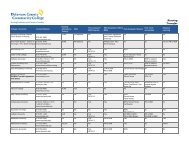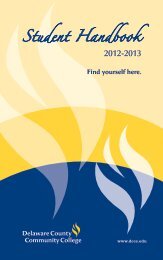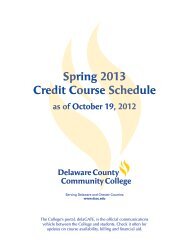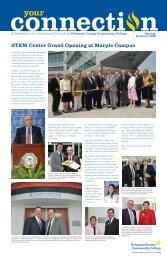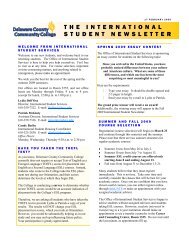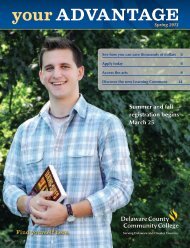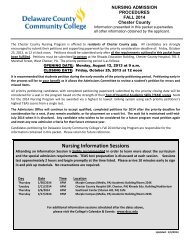2010 Catalog - Delaware County Community College
2010 Catalog - Delaware County Community College
2010 Catalog - Delaware County Community College
You also want an ePaper? Increase the reach of your titles
YUMPU automatically turns print PDFs into web optimized ePapers that Google loves.
COURSE DESCRIPTIONS 159<br />
• Interact effectively in the social context.<br />
• Describe the significance of self-awareness in building<br />
good human relationships.<br />
• Distinguish between the formal and informal structures<br />
of an organization as they relate to appropriate<br />
human relations.<br />
• Describe appropriate employee on-the-job behavior,<br />
especially during the first few probationary months.<br />
• Describe how the impact of human relations in the<br />
leadership and motivational areas can affect productivity.<br />
3 Credits 3 Weekly Lecture Hours<br />
SOC 110<br />
Introduction to Sociology<br />
The factors that determine social organization, behavior<br />
and change are considered in relation to the individual<br />
student's own life. Study is concentrated on social<br />
intervention, culture, social class, demography, collective<br />
behavior, institutions and socialization.<br />
Upon successful completion of this course, the student<br />
should be able to:<br />
• Apply the sociological perspective to their own lives.<br />
• Further personal development through knowledge and<br />
in the socialization process.<br />
• Describe the impact of the five major social institutions<br />
on society and themselves.<br />
• Assess present and possible future effects of social<br />
change on their culture's and their own basic values.<br />
• Depict the effects of living in a modern complex society.<br />
• Use the three major sociological theoretical perspectives<br />
to analyze a major concept within sociology.<br />
Prereq. ENG 050 and REA 050 or pass test<br />
3 Credits 3 Weekly Lecture Hours<br />
SOC 120<br />
Social Problems<br />
This course studies contemporary social problems from<br />
theoretical and practical perspectives. Field study brings<br />
students into contact with both public and private agencies<br />
and institutions. Special projects are required.<br />
Upon successful completion of this course students<br />
should be able to:<br />
• Apply the sociological perspective to the field of<br />
social problems.<br />
• Describe the origin, development, and society's<br />
possible treatment of at least two contemporary<br />
and three traditional social problems.<br />
Prereq. ENG 050 and REA 050<br />
3 Credits 3 Weekly Lecture Hours<br />
SOC 130 The Elderly and the Criminal<br />
Justice System Special Studies<br />
This course is designed to study the agencies, processes<br />
and people involved in the criminal justice system as it<br />
focus on problems with the elderly. Legislatures, law<br />
enforcement, prosecution, courts, corrections issues are<br />
studied with respect to the elderly. Emphasis will be<br />
made on the challenges faced by the criminal justice system,<br />
when dealing with issues associated with senior citizens.<br />
Particular attention will be dedicated to different international<br />
approaches to these issues in the study of gerontology.<br />
Upon successful completion of this course, students<br />
should be able:<br />
• Explain the problems faced by the police in dealing with<br />
the Elderly as victims and as perpetrators.<br />
• Recognize the various methods of fraud perpetrated<br />
against Medicare and Medicaid.<br />
• Discuss the rising rate of elder abuse as it relates to the<br />
family, caretakers and nursing homes.<br />
• Understand the impact of the Criminal Justice process<br />
on the Elderly as eyewitnesses and Jurors.<br />
• Delineate the problem of sentencing elderly<br />
convicted offenders.<br />
• Outline the strategies used to handle elderly prisoners.<br />
• Discuss various international approaches to the<br />
relationship of the Elderly to the various criminal<br />
justice systems.<br />
Prereq. SOC 110 or SOC 111 or PSY 110<br />
3 Credits 3 Weekly Lecture Hours<br />
SOC 180 Sociology of Marriage and<br />
The Family<br />
This course explores the various types of paired<br />
relationships in American society.<br />
Upon successful completion of this course, students<br />
should be able to:<br />
• Describe the American family in terms of the three<br />
major sociological theories.<br />
• Explain the concepts concerning who marries whom.<br />
• Explain human reproduction, including prenatal aspects,<br />
childbirth, contraceptive techniques and socially<br />
transmitted diseases.<br />
• Assess possible future changes, marriage forms<br />
and living arrangements as they may affect the<br />
American family.<br />
Prereq. ENG 050 and REA 050<br />
3 Credits 3 Weekly Lecture Hours<br />
SOC 205 Victimology Special Studies<br />
This is a survey course covering contemporary developments<br />
in the field of victimology, its conceptual boundaries,<br />
its basic concepts and literature, its subfields and role as<br />
a field of study within criminology and criminal justice.<br />
The historical and emerging roles of victimology as a field<br />
are examined and discussed in depth. Special attention is<br />
paid to applied learning objectives with respect to each<br />
student’s personal experiences with human dimensions of<br />
victimization. This course also deals with analysis of<br />
contemporary programs and trends in the criminal justice<br />
system’s response to victims.<br />
Upon successful completion of this course, students<br />
should be able:<br />
• To increase familiarity with basic terms, concepts and<br />
ideas in victimology.<br />
• To appreciate the historical development of Victimology<br />
and its subfields.<br />
• To explore and analyze contemporary problems and<br />
trends in victimology.<br />
• To review the functions, operations and management of<br />
the criminal justice system.<br />
• Describe the basic components of the Criminal Justice<br />
System which pertain to victim assistance.<br />
• Identify the liabilities of individuals who perpetrate<br />
criminal acts upon victims.<br />
• Recognize the requirements of various Pennsylvania<br />
criminal statutes in protecting victims rights.<br />
• Identify the important role victims playing in vindicating<br />
their own rights through victim impact statements.<br />
Prereq. ADJ 101 or PSY 110 or SOC 111<br />
3 Credits 3 Weekly Lecture Hours<br />
SOC 207 Sociology of Urban Spaces &<br />
Migration Special Studies<br />
This course looks at the way in which urban space is<br />
constructed through the movement of people, and its<br />
relationship to culture, economics, and politics around the<br />
world. Topics include: global cities, immigration, inequality<br />
and social segregation.<br />
Upon successful completion of this course, students<br />
should be able to:<br />
• Appreciate the different reasons people have for living in<br />
cities and how those reasons urban life and urban form.<br />
• Be familiar with the histories and geographies of<br />
globalized urbanization.<br />
• Understand some of the major similarities and differences<br />
among cities particularly ‘global’ or ‘world’ cities.<br />
• Be aware of forms of urban inequality both within cities<br />
and between them.<br />
• Know the pathways of globalized urbanization in the<br />
older industrialized world, the developing world and on<br />
the ‘margins of the world economy.<br />
3 Credits 3 Weekly Lecture Hours<br />
SOC 210<br />
Cultural Anthropology<br />
The socio-humanistic facts of culture are viewed via a<br />
thematic cross-cultural approach. Evolution of community<br />
living from band to post-urban and its effects of individual<br />
behavior is explored.<br />
Upon successful completion of this course, students<br />
should be able to:<br />
• Apply the cultural anthropological perspective to his/her<br />
own life.<br />
• Demonstrate usage of the fundamental principles<br />
involved in the study of culture to daily living.<br />
• Explain various types of "world views" as found in<br />
different cultures.<br />
• Describe the impact of the cultural environment upon<br />
the student's personality.<br />
• Assess the effects of cultural change upon the student's<br />
own and his/her culture's fundamental values.<br />
Prereq. SOC 110<br />
3 Credits 3 Weekly Lecture Hours<br />
SOC 215<br />
Experiences in Diversity<br />
This course critically examines societal and personal<br />
attitudes, values and norms regarding diversity. Topics<br />
include: race, ethnicity, gender and sexual preference. We<br />
will examine how these factors influence our perception<br />
of self and others.<br />
Upon successful completion of the course, students<br />
should be able to: Demonstrate critical thinking on issues<br />
of race, gender, ethnicity and sexual orientation.<br />
• Describe the impact of minority and majority status as it<br />
pertains to economic, psychological and social experience.<br />
• Describe the etiology of racism, sexism, ethnocentrism<br />
and homophobia.<br />
• List some of the contradictions of our multicultural<br />
society and different strategies toward resolving them.<br />
• Evaluate the positive and negative dimensions of your<br />
own cultural experience. Identify personal values that<br />
promote understanding and cooperation among<br />
human beings.<br />
• Discuss how culture and gender shape our personal<br />
identities and behaviors.<br />
Prereq. PSY 140 or SOC 110<br />
3 Credits 3 Weekly Lecture Hours<br />
SOC 219 The Sociology of Race And<br />
Immigration Special Studies<br />
In this class we will examine the Eurocentric construction<br />
of race, delving into how it became a central organizing<br />
principle in North American society. We will also examine<br />
the when, the why, and the how of immigrant arrival in<br />
the USA, paying close attention to the manner in which<br />
various group experiences in the U.S.A. were (and are)<br />
similar to, and different from, one another. This class will<br />
be both historical in nature and present-day oriented.<br />
That is, we will examine the when, why, and how of the<br />
development of racial categories, ideology, and racism.<br />
We will take the time to study the past because without<br />
such knowledge we can neither understand nor examine<br />
the current system of racial domination. This type of<br />
inquiry will help shed light on how historical circumstances<br />
continue to impact and shape current racialized identities<br />
and disparities today. In this class we will examine<br />
various racial and ethnic group experiences within the<br />
context of race-based theories. These theories attempt to<br />
provide explanations as to why (1) various racial groups<br />
were/are treated in specifically different ways (accorded<br />
privilege or penalization); (2) some racial groups were/are




